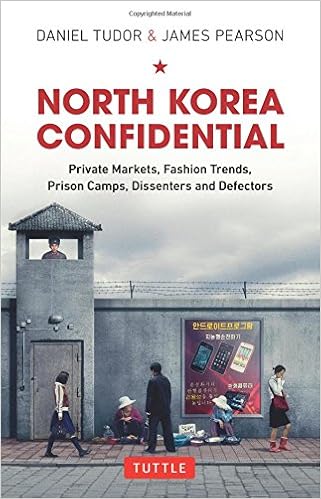


Flip to back



 See all 7 images
See all 7 imagesNorth Korea Confidential: Private Markets, Fashion Trends, Prison Camps, Dissenters and Defectors Hardcover – April 14, 2015
by Daniel Tudor (Author), James Pearson (Author)
4.3 out of 5 stars 55 customer reviews
Editorial Reviews
Review
"Dispelling the myth of a brainwashed populace is one of the main goals of the book. Despite horrific prison camps, lack of Internet, and a national fabric called "vinylon," most people still take the risk to watch a foreign film, regularly consume South Korea pop culture, party, and even argue with the police." —The Daily Beast
"North Korea Confidential…uses extensive interviews with recent defectors and people still in the country to build a rich picture of daily life there." —Financial Times
"North Korea Confidential gives us a deeply informed close-up. Tudor, a former correspondent for The Economist, and Pearson, a Reuters reporter, have pieced together their story from North Korean insiders, defectors, diplomats and traders, and from a careful reading of texts in English, Korean and Chinese." —New York Times
"North Korean society is rapidly changing, affecting everything from what people watch on TV to what they sing at karaoke. With the help of a new book charting daily life we see if you've been paying attention." —The Guardian
"North Korea Confidential, by James Pearson and Daniel Tudor, says that nearly all North Koreans lead a 'double economic life', supplementing measly rations and puny state wages of as little as $1 a month with extra work in their spare time." —The Economist
"In a new book that the authors say aims to document 'North Korea, the country' rather than 'North Korea, the state,' two journalists —Daniel Tudor, former correspondent for the Economist in Seoul, and James pearson, currently a Reuters reporter in Seoul—tap a wide range of sources to describe the lives of ordinary North koreans. —Wall Street Journal
"The authors, both journalists in the region, do their best to beat the stereotypes that have been scraped together over the years, 'the ridiculous international media image that suggests that DPRK citizens are robots who simply live to serve their 'Dear Leader.'" —Associated Press
"…it is refreshing to find a book that neither obsesses excessively over the nuclear issue nor treats the Democratic People's Republic of Korea (DPRK) as simply a bad joke or the world's most irrational place." —Andrei Lankov, Reason
Read more
About the Author
Daniel Tudor is from Manchester, England, and graduated with a BA in Philosophy, Politics, and Economics from Oxford University. He has lived in Seoul, Korea for a number of years, and served as The Economist's Korea Correspondent from 2010-2013. His first book, 'Korea: The Impossible Country' received strong praise and has also been translated into Korean, Chinese, Polish, and Thai. Daniel is a regular columnist for a Korean newspaper, the Joongang Ilbo, and has commented on Korea-related topics many times for the BBC, Al Jazeera, and others. He is also co-founder of The Booth, a small chain of craft beer pubs.
James Pearson is a foreign correspondent for Reuters in Seoul, where he covers politics and general news in North and South Korea. He holds a BA (hons) in Chinese and Korean from the University of London's School of Oriental and African Studies (SOAS) and a Master's of Philosophy (M.Phil) in Oriental Studies from the University of Cambridge.
Product details
|
No comments:
Post a Comment